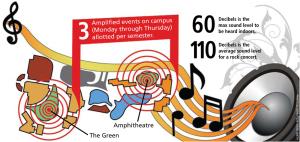 The new amphitheater might trump the Green and prove to be the ultimate battleground next year as the civil skirmish between students and faculty continues regarding campus-wide sound restrictions.
The new amphitheater might trump the Green and prove to be the ultimate battleground next year as the civil skirmish between students and faculty continues regarding campus-wide sound restrictions.
The amplified sound policy has been a topic of discussion at Faculty Association meetings, and recently, the Faculty Affairs Committee determined the current policy is not being applied consistently, as teachers have complained about noise during class times.
“It’s not so much the events we object to, [but] we have difficulty when those events conflict with classroom teaching,” said Judith Solano, a member of the Faculty Affairs Committee. “So what we’re trying to do is establish policy to restrict when and where so there is no conflict.”
The latest revision to the amplified sound policy is just one more step in a debate that has continued for more than 30 years, said Solano, School of Computing chair and associate professor.
The latest revision to the policy submitted by the Faculty Affairs Committee states, “amplified sound will be permitted on the Green or any outdoor space adjacent to classroom buildings Monday through Thursday between noon and 1:30 p.m., no more frequently than three times a semester.
Events involving amplified sound may also be scheduled Friday and Saturday after 3:50 p.m. and any time on Sunday.”
Solano said she knows there is more to going to school than just class, but a compromise between classroom instruction and student activities must be found.
Larry Daniel, dean for the College of Education and Human Services, has an office that is in direct sight of the Green. He said issues with amplified sound have been problematic in the past when faculty members were not advised of the events.
In some cases, organizations set up sound equipment without taking the proper measures to get approval from Student Affairs.
That is the main communication issue Daniel sees. He said the worst cases are when the events are not announced to teachers.
When communications are made to inform teachers that a disruption is eminent, Daniel agrees teachers can make the preparations to cancel class, move to another room, or find some alternative to the issue.
“I think if we have a reasonable number of events and the knowledge of disruption is communicated ahead of time, we can deal with a lot,” Daniel said.
In the past, Solano said she has had to cancel class because of noise, but she agrees the notification process that has been implemented to inform teachers of upcoming events has been effective.
“Some would say we’re here to teach and that’s all it’s about and that everything else should take a back seat, but I don’t believe that,” Solano said.
A major component of learning takes place outside the classroom and involves music, said Oupa Seane, director of the UNF Intercultural Center.
“There’s no way with which one can lend somebody else’s culture without involving music,” Seane said. “While it is entertainment, it is enlightening.”
Seane was recently forced to cancel WorldFest 2009 because of complaints of music that stemmed the amplified sound ordinance. He said he felt the event would not be successful or enjoyable without the presence of music.
“There was no way we would be able to comply, and we wanted to keep faculty happy,” Seane said.
But the culmination of the sound restrictions are coming at a time when Student Body Vice President Mike Saathoff thinks UNF is just breaking out of its shell and becoming more of a destination college with amenities like the new Student Union.
The sound regulations hinder UNF from reaching a new level of student involvement and school spirit, he said.
Student Union Director Justin Computaro said he wishes to find a compromise successful for both faculty and students.
“We’re here for the education of students and don’t want to interfere with classes,” Computaro said. “At the same time I have a challenge that students, in order to have a full college experience, want entertainment, life and energy … And that doesn’t come from being quiet.”
Enforcing sound restrictions would defeat the purpose of a student’s college experience and would damper the success of the $50 million Student Union and amphitheater, he said.
In preparation for construction of the amphitheater, Computaro said sound tests were conducted two years ago and it was decided to place the 108,000-square-foot amphitheater on the perimeter of campus to make full use of its 7,000-person capacity. He said the design directs noise away from campus into natural barriers of wooded area.
“We would love for [the amphitheatre] to be used as often as possible,” UNF President John Delaney said. “But we need to make sure that there is not disruption of classes.”
E-mail Jonathan Morales at news@unfspinnaker.com.











